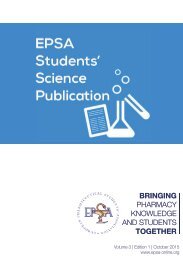V23E3
Create successful ePaper yourself
Turn your PDF publications into a flip-book with our unique Google optimized e-Paper software.
JAHWF Conference<br />
Just another abbreviation?<br />
“Pharmacists will retain their essential role in<br />
dispensing and supply of medicines”, “Norway has<br />
new a medicine service which helps patients with the<br />
adherence to their medication”, “Ireland vaccinates<br />
in pharmacies as well as the UK! This raises the<br />
level of vaccination across the population”, “A New<br />
pharmacy contract negotiated in Portugal includes<br />
many pharmacy services”.<br />
These and many other tweets could have been read<br />
under the hashtag #JAHWF between 17th and 19th<br />
February 2015, when the 3rd Conference of JAHWF<br />
took place. But JAHWF? What is it? Another of many<br />
abbreviations? Exactly! Literally! The abbreviation<br />
stands for Joint Action for Health Workforce Planning<br />
and Forecasting which deals with the shortage (but<br />
also oversupply) of healthcare workers. During this<br />
two-days conference, I had the pleasure to join other<br />
European stakeholders and discuss about the future<br />
of, us, the healthcare workers.<br />
Starting with the symposium which was moderated<br />
by Michel Van Hoegaerden, the Joint Action Health<br />
Workforce Programme Manager from Belgium,<br />
several speakers shared their key notes. We had<br />
the opportunity to hear from several members<br />
of Ministries of Health in Bulgaria, but also the<br />
Secretaries of State from Slovakia (Mario Mikloši)<br />
and Moldova (Nicolae Jelamschi), as well as<br />
Directorate General for health and food safety from<br />
the European Commission (Caroline Hager) and also<br />
Federal Public Service of Health (Michel Devriese)<br />
and European Observatory of Health Systems and<br />
Policies (Irene A. Glinos) were present. The main<br />
outcome was that Europe already faces a shortage<br />
of healthcare professionals. According to WHO, in<br />
2035, we will lack 18 million healthcare workers.<br />
“Young professionals are stem<br />
cells of the healthcare system”<br />
After the symposium, parallel sessions took place,<br />
which allowed participants to choose the part<br />
of Joint Action they were interested in. I chose to<br />
attend a session with the topic of Health Workforce<br />
Education Abroad: “Is this a business, an opportunity,<br />
a need, a real brain drain or all four?” We started<br />
the session with a very interesting presentation<br />
delivered by professor Ian Cumming, member of<br />
Health Education England, who shared the United<br />
Kingdom’s perspective and lessons learned from<br />
training and migration between their four countries.<br />
During the presentation, professor Cumming<br />
compared the situation in all four countries of the<br />
United Kingdom to help us understand the topic.<br />
An interesting project that derived from the<br />
collaboration of Germany and Bulgaria was<br />
introduced as the next part of the programme.<br />
In Germany, more than 40 000 youngsters apply<br />
for a medical faculty per year, however, only a<br />
small percentage can make it due to the capacity<br />
of faculties, and this small percentage does not<br />
cover the needs of the German healthcare system.<br />
Therefore, Germans paired up with Bulgarians to<br />
yearly send German students to finish their education<br />
in Bulgaria, where the capacity is higher. German<br />
students shall return after their studies to boost the<br />
healthcare workforce.<br />
To see the perspective of students as well, we were<br />
able to hear the presentation of medical students from<br />
the University of Varna, two being Bulgarian and two<br />
German. The comparison of both systems of education<br />
took place and an interesting discussion arose.<br />
24 European Pharmaceutical Students’ Association









